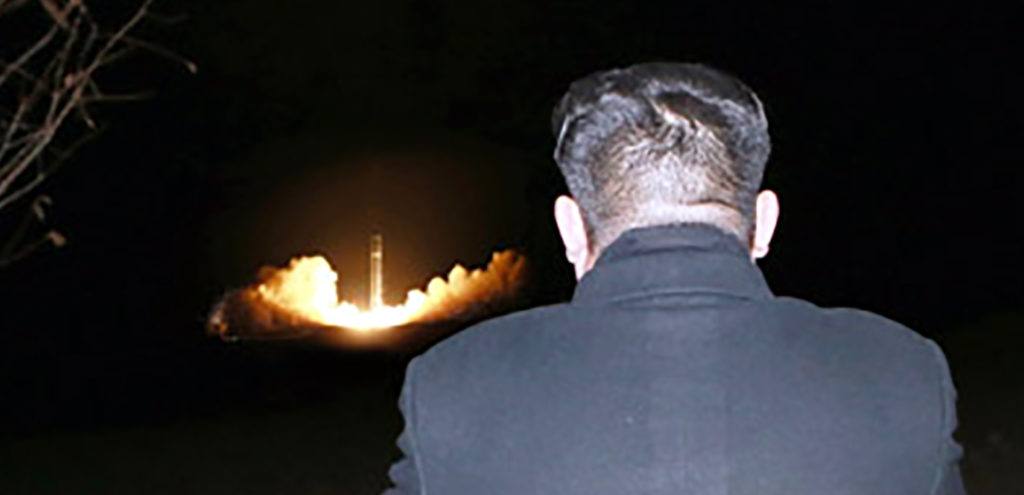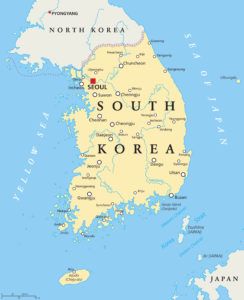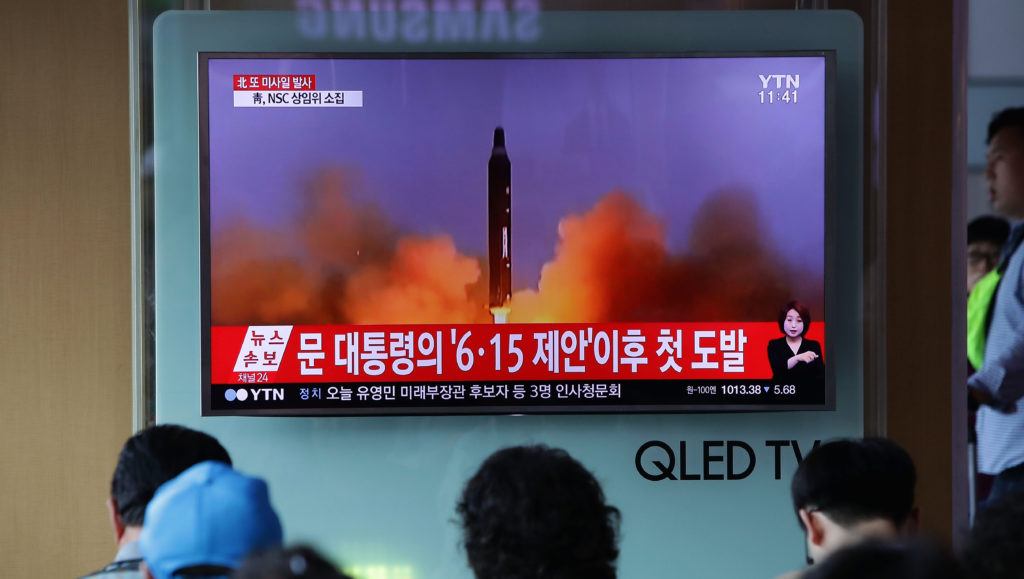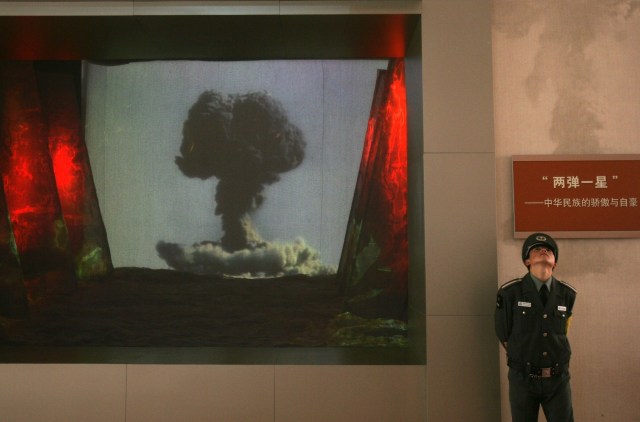An exhibition about the rejuvenation of China at Beijing’s Military Museum included this feature on its atomic bomb testing (Photo by China Photos/Getty Images)

Kim Jong-un’s “charm offensive” at the Winter Olympics is not fooling the President of the Republic of Korea, and it shouldn’t fool anyone else. North Korea’s nuclear ambitions pose an unacceptable threat to the United States – and China is the best prospect for a peaceful solution, argues Philip Bobbitt, Professor of Federal Jurisprudence at Columbia University, Director of its Center for National Security, and a former Senior Director for Strategic Planning at the US National Security Council.

On 3 September 2017 North Korea conducted a test of a nuclear weapon. Seismic tremors from this test suggest that it was almost certainly a hydrogen bomb in the early stages of development. The test followed an August 28 intermediate range ballistic missile launch over Hokkaido (Japan) and on November 28 of an intercontinental ballistic missile capable of carrying a nuclear warhead. The purpose of these tests is to pose a mortal threat to US security such that not only would the United States be unwilling to launch a campaign to change the North Korean regime, but that it would also be unwilling to put its homeland at risk in order to enable South Korea to resist demands for a forcible reunification of the Peninsula.
The current US options
At present, the US seems to have only three options:
- the continued diplomatic pursuit of phased negotiations with North Korea by which it is hoped that the imposition of economic sanctions – and the ultimate promise to lift those sanctions – will induce the North Koreans to freeze the development of their nuclear weapons programme, halt further missile testing, and eventually roll back their nuclear weapons program.
- the use of military force either as a demonstration to dissuade the North Koreans from pursuing their nuclear weapons ambitions or to actually destroy the weapons facilities and launchers that are the result of those ambitions.
- the tacit acceptance of a North Korean nuclear arsenal capable of delivering nuclear weapons to US soil, coupled with threats to retaliate against North Korea were those weapons ever to be used to attack the US.
China has an important role to play, as the US recognises, in all of these scenarios. What is less well recognised is that each of them would be a disaster not only for the US but also for China.
Sanctions don’t bite quick enough
The first option depends upon the international community aggressively pursuing economic and diplomatic pressure on North Korea. Since 2006, at the urging of the United States, the UN Security Council has adopted eight resolutions imposing increasingly costly sanctions on North Korea, including severe limits on its weapons trade, banking, and various financial transactions.
China is the key player here, because approximately 90% of North Korea’s international trade is with China. I’m convinced, however, that there is nothing the international community generally and China specifically can win from the imposition of sanctions that will result in the Kim regime abandoning its nuclear weapon and ballistic missile programmes. That is because the regime sees these programmes as the guarantee of its security and the regime has shown itself willing to impose enormous suffering on its people and incur the hostility of many states including China in order to assure its hold on power.
I think that privately, most people who urge this option recognise this but they say that if negotiations could at least slow down North Korea’s programmes, eventually the people of North Korea – either in a general uprising, or acting through alienated members of the leadership – will overthrow the regime. It will be increasingly difficult for North Korea to keep its citizens from being exposed to the world outside and, it is said, this will increase pressure on Kim Jong-un to find ways to strengthen the economy, increase international trade, and pursue economic growth. The fact that the regime has decisively rejected this policy, which it had earlier pursued with Chinese interlocutors, makes it clear, however, that nothing short of a coup d’état or a revolution – a dim prospect – could really alter North Korea’s commitment to be a nuclear weapons power.
The use of force: The operation would be successful, but the patient would die

The second option, the use of kinetic attacks on the North Korean military, is in my view totally unrealistic at this time. Those who suggest it seemed to have lost track of the reason why we are opposing North Korea’s nuclear programs in the first place. We are in Korea to protect an ally, the republic of South Korea. The consequence of a US preemptive strike against North Korea would leave Seoul in ruins.
It would be an act for which the US would not be forgiven and one which could well unravel both the system of US alliances and US nonproliferation efforts in the region for which our deterrent and our military presence have been responsible. Nor would it be without enormous cost to China. An American military attack on North Korea would trigger the Chinese military alliance with North Korea. China would be compelled to deploy military force in North Korea with the objective, at a minimum, of creating a buffer zone to prevent millions of North Koreans from pouring into China.
The North Korean regime might well collapse under such attacks but the consequences for China including a South Korean military presence on its border, are quite unacceptable.
If nuclear deterrence worked in the Cold War, why not with North Korea?
The third option, which might be called a version of “containment”, is no more realistic than the first two. This would mean the acceptance of the development of a North Korean nuclear weapons capability that threatens the American homeland.
But, it is urged, the US was willing to accept just such hostile capabilities in the case of the Soviet Union and China. By credibly threatening to destroy those countries by means of nuclear retaliation should the American homeland be attacked by them, US forces kept that homeland safe. That was the rationale, at any rate, responsible for the Kennedy administration’s determining not to preempt the nascent and vulnerable Chinese nuclear program as many in that administration urged.
The problem is that North Korea’s strategic objectives are very different from those of either China or the Soviet Union. North Korea’s paramount goal is to unite the Korean Peninsula. And while the US deterrent would doubtless protect the US homeland, striking the US homeland is not the North Korean objective. Rather its objective is to put South Korea in the position of asking the United States to leave the Peninsula so as to avoid a conflict that would destroy both North and South Korea. This would not be an unrealistic choice by South Koreans who could well calculate that the American defense of their government would mean the destruction of the society.
Such a scenario might be superficially appealing to China. After all, isn’t it Chinese policy to see the Americans leave the region and abandon its local alliances? In fact, this may be the most dangerous option of all for China because it leads directly to the proliferation of nuclear weapons to both South Korea and Japan. It is the US extended deterrent protecting these countries that has kept them from acquiring their own nuclear arsenals; remove this deterrent, and both states have the technology, and technocracy, wealth and face threats that would impel them to acquire their own nuclear arsenals.
An unexplored option: ‘The Greater Will of China’
If China were to give a credible nuclear guarantee to North Korea in the case of a US invasion or preemptive strike against the regime, there would be little point in North Korea risking the survival of its regime by developing long-range nuclear weapons.
This policy is not to be confused with the current mutual defense pact between North Korea and China, one cornerstone of which is China’s no-first-use policy. Getting under China’s nuclear umbrella, however, could provide Kim a greater chance of long-term survival than a nuclear arsenal vulnerable to US first strike and anti-missile technologies. Indeed, without the protection of Chinese nuclear extended deterrence, Kim’s allegedly defensive strategy will almost certainly lead to his eventual destruction with enormous human costs to the peoples of the Peninsula.
Chinese nuclear deterrence must, however, sit within a much larger diplomatic and legal framework. In February, 1951, during the Korean War, peace negotiations began between China, its ally the North Koreans, and United Nations led by the United States. These lasted more than two years during which there was a military stalemate. The final agreement, signed on July 27, 1953 merely provided for an armistice and created a two mile wide demilitarised zone – roughly along the 38th parallel.
That ceasefire agreement still holds. Legally, the Korean War is merely in abatement and has not terminated because no final peace settlement has been agreed upon. Both North and South Korea claim to be the sole legitimate government of the Peninsula.
This situation is similar in some aspects to that which the Soviet Union faced in the mid-1970s. Then, also, the boundaries of its allies were unrecognised because their frontiers had been forged in the aftermath of World War II and there was no peace agreement between the Soviet Union and the Western states. In that sense, the Helsinki Accords of 1975, though not a binding treaty, finally ended World War II and recognised the inviolability of the postwar borders.
I propose a similar conference, convened by the UN, to include North Korea, South Korea, Japan, China, the US and Russia with the objective of finally ending the Korean War and recognising the borders of both Koreas. Roughly speaking, the US and China would be in the position of the US and the Soviet Union at Helsinki.
President Xi, the statesman
Why would China want to assert its leadership in this way? And if it did, why would the North Koreans – at present wary of China – accept the offer?
As I’ve indicated, the alternatives for China are bleak: the continuation of the current diplomatic strategy by which the international community has made China responsible to pressure North Korea is a strategy that makes both China and the US look weak in the region and makes China responsible for the failure of impossible diplomatic task.
The outcomes of the three currently recognised options all have deadly and incalculable consequences for China. On the other hand, accepting the leadership role as a co-convener of a conference that finally ends the Korean War and that takes these catastrophic options off the table is very much in China’s interest. It would secure for China a diplomatic role as a great power that its economic growth alone cannot achieve. It would defuse a regional conflict with the United States. It offers the only realistic means of restraining a troublesome ally whose ultimate ambitions do not coincide with those of China.

Why would North Korea accept such a Chinese offer?
North Korea’s rationale appears to run like this: no guarantee by the United States or by the international community that North Korea believes is being led by United States, can be trusted. Only the capability to deploy hydrogen warheads launched by long-range ballistic missiles that could destroy American cities can provide an ironclad guarantee for the regime. North Korea believes that there is nothing of such value to the Americans on the Peninsula that would lead them to risk – or suffer – the deaths of millions of Americans. Once testing confirms their capabilities, the regime will be safe and its dynasty can rest easy.
There is an error in this reasoning, however. As long as only American allies, like South Korea and Japan, were threatened by North Korea there was no urgent need for the US to act to remove the Kim regime. It was thought that if we simply played for time eventually the sort of internal contradictions that resulted in the destruction of the regimes that governed the Warsaw Pact states would bring about a similar transformation in North Korea. The US could afford to wait. But now, whether by design or miscalculation, the US homeland has been brought into jeopardy. Now, there is an immense incentive for the US to surge the development of its nuclear damage limitation capabilities – the ability to limit North Korea’s capacity to inflict retaliatory damage on the US. North Korea’s manoeuvres to secure its future have made it now so deadly to the US that its eventual destruction is sealed.
Only one manoeuvre could save North Korea: the acquisition of a credible nuclear guarantee by China. It is scarcely conceivable of the US would risk nuclear retaliation from China just to remove the Kim regime if that regime no longer posed a mortal threat to American cities. In fact, North Korea’s negotiating strength is at its zenith now but its peril will only grow in the absence of such a Chinese guarantee.
Our aim must be to re-orient Kim’s paranoia, making him more afraid of losing an attractive opportunity for security in the eyes of his own people than he is afraid of dependence on China.









Join the discussion
Join like minded readers that support our journalism by becoming a paid subscriber
To join the discussion in the comments, become a paid subscriber.
Join like minded readers that support our journalism, read unlimited articles and enjoy other subscriber-only benefits.
Subscribe